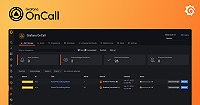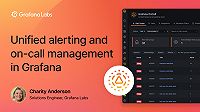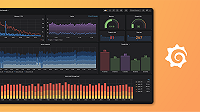Caution
As of 2025-03-11, Grafana OnCall OSS has entered maintenance mode, and will be archived on 2026-03-24. No further feature development will occur; however, we will still provide fixes for critical bugs and for valid CVEs with a CVSS score of 7.0 or higher. For more information, refer to our blog post.
Important: This documentation is about an older version. It's relevant only to the release noted, many of the features and functions have been updated or replaced. Please view the current version.
AppDynamics integration for Grafana OnCall
This integration is not available in OSS version
The AppDynamics integration for Grafana OnCall handles health rule violation events sent from AppDynamics actions. The integration provides grouping and auto-resolve logic via customizable alert templates.
You must have the role of Admin to be able to create integrations in Grafana OnCall.
Configuring Grafana OnCall to Receive Alerts from AppDynamics
- In the Integrations tab, click + New integration.
- Select AppDynamics from the list of available integrations.
- Enter a name and description for the integration, click Create
- A new page will open with the integration details. Copy the OnCall Integration URL from HTTP Endpoint section. You will need it when configuring AppDynamics.
Configuring AppDynamics to Send Alerts to Grafana OnCall
Create a new HTTP Request Template in AppDynamics to send events to Grafana OnCall using the integration URL above.
Refer to [AppDynamics documentation] (https://docs.appdynamics.com/appd/23.x/latest/en/appdynamics-essentials/alert-and-respond/actions/http-request-actions-and-templates) for more information on how to create HTTP Request Templates:
Use the following values when configuring a new HTTP Request Template:
Request URL:
- Method: POST
- Raw URL: OnCall Integration URL from previous section
Authentication:
- Type: None
Payload:
- MIME Type: application/json
- Template:
{ "event": { "eventType": "${latestEvent.eventType}", "id": "${latestEvent.id}", "guid": "${latestEvent.guid}", "eventTypeKey": "${latestEvent.eventTypeKey}", "eventTime": "${latestEvent.eventTime}", "displayName": "${latestEvent.displayName}", "summaryMessage": "${latestEvent.summaryMessage}", "eventMessage": "${latestEvent.eventMessage}", "application": { "name": "${latestEvent.application.name}" }, "node": { "name": "${latestEvent.node.name}" }, "severity": "${latestEvent.severity}", "deepLink": "${latestEvent.deepLink}" } }Response Handling Criteria:
- Success Criteria: Status Code 200
Settings:
- One Request Per Event: Enabled
After setting up a template, create a new action in AppDynamics and select the template you created earlier. Now you can configure policies to trigger the action when certain events occur in AppDynamics. When configuring a policy, select the following events to trigger the action:
Health Rule Violation Started - Warning
Health Rule Violation Started - Critical
Health Rule Violation Continues - Warning
Health Rule Violation Continues - Critical
Health Rule Violation Upgraded - Warning to Critical
Health Rule Violation Downgraded - Critical to Warning
Health Rule Violation Ended - Warning
Health Rule Violation Ended - Critical
Health Rule Violation Canceled - Warning
Health Rule Violation Canceled - CriticalAfter setting up the connection, you can test it by sending a test request from the AppDynamics UI.
Understanding How Alerts Grouped and Auto-resolved
Grafana OnCall provides grouping and auto-resolve logic for the AppDynamics integration:
- Alerts created from health rule violation events are grouped by application and node name
- Alert groups are auto-resolved when the health rule violation is ended or canceled
Complete the Integration Configuration
Complete configuration by setting routes, templates, maintenances, etc. Read more in this section



